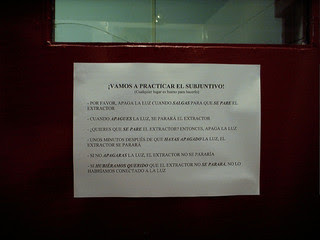Conjugating the subjunctive mood
 |
| Learning Spanish subjunctive in the bathroom! Photo credit: Academia IF licensed CC BY 2.0 |
The last step in subjunctive conjugation is adding the appropriate ending to the root depending on whether the original verb ends in -ar. If it’s an -ar verb, the endings are added as:
First person singular (-e)
Second person singular (-es)
Third person singular (-e)
First person plural (-emos)
Second person plural (-éis)
Third person plural (-en)
If it’s not an -ar verb, we append these endings to the root in order to conjugate in the subjunctive mood:
First person singular (-a)
Second person singular (-as)
Third person singular (-a)
First person plural (-amos)
Second person plural (-áis)
Third person plural (-an)
Well, knowing how to conjugate is no big deal. It’s all about endings and roots. The big deal is remembering these conjugated forms during active speech. You cannot conjugate in the background while speaking and expect to become fluent. When natives speak, they son’t conjugate. They just have the appropriate forms on the tip of their tongue and that’s the reason why they are able to speak Spanish with such superhuman fluency.
One easy way to be able to retain these endings and recall them real-time is by listening to music. Lyrics that are heavy with conjugated verbs in this mood. This way, every time you hum the catchy tunes, you drive these conjugations deeper into you and eventually they become ingrained in your most active memory.
Fanny Lú and Lágrimas Cálidas
Fanny Lucía Martínez Buenaventura is a Colombian singer and songwriter from Santiago de Cali specializing in Latin pop and tropipop, a genre born in Colombia in the early 2000s as a fusion of traditional musical forms of the Caribbean Colombia (mainly Vallenato) with genres like Salsa, Merengue, and pop. At this stage, it is important to note, as a cultural trivia, that tropipop and Reggaeton are the most popular music genres in today’s Colombia.
As a child, Fanny attended Colegio Bolivar and later moved to France to finish her elementary education. Having received a degree in industrial engineering from the University of the Andes and having worked as an actress in the Colombian telenovela, Perro Amor, Fanny has an interestingly non-musical background.
Her musical career began in 2006 when she signed up with Universal Music Latino and launched Lágrimas Cálidas (Warm Tears) under the stage name, Fanny Lú. Lágrimas Cálidas, with two singles that topped Latin charts, made Fanny a household name in Colombia and brought her recognition in all of Latin America. Upon release, this album spent a good 5 weeks on top of the charts in Colombia, a rare feat for a debut album. Two years later she released another chartbuster, Dos (Two) which consolidated her musical career and established her as a recognized name on the Colombian music scene.
No Te Pido Flores
No Te Pido Flores (I Don’t Ask For Flowers) is Fanny’s debut song and the lead single from her first studio album, Lágrimas Cálidas. Having spent 7 weeks on top of the Hot 100 Billboard Charts in Latin America, this is by far one of Fanny’s most successful singles. In the US, this single made #16 on the Billboard Hot Latin Songs and topped the Billboard Tropical Songs chart. Vouching for its quality, this song also received a Latin Grammy nomination for the “Best Tropical Song” and a Billboard Music Latin nomination for “Tropical Airplay of the Year”.
What makes this song so special for those learning Spanish is the overwhelming concentration of the Spanish subjunctives in its loaded lyrics. The best part is that even the chorus is rich in subjunctives and by virtue of their repetitive placement, help you absorb this mood much more efficiently as compared to mindless cram-sessions. As always, here’s a portion of the complete lyrics with a rough English translation for your review. Be sure to listen to the song plenty of times and get comfortable with it before you actually start with translated lyrics.
Si se fue yo no se bien (Whether he’s gone, I’m still not sure)
Aún me resigno a no entender (I’m resigned to not understanding)
Que pasan noches ya sin él (How nights go by without him)
Como antes de que fuera mío. (Just like before he was mine.)
Definitivo yo no sé (I definitely don’t know)
Una semana y será un mes (One week and it will be a month)
Que pasa un día sin que muera (That days go by, without me dying)
Suspirando en el vacío. (Sighing in the emptiness.)
Y ya no quiero ser (I don’t want to stay like this)
Tan debil como el viento (Weak like the wind)
Cuando la tormenta se ha ido (When the storm is gone)
Que ya no sopla y esta frío (It’s died down and now it’s cold)
Sin tu calor. (Without your warmth.)
Coro: (Chorus:)
No te pido que traigas flores (I don’t ask that you bring flowers)
Tampoco que me des bombones (Or that you give me chocolates)
Yo sólo quiero una caricia (I only want your touch)
Que me digas que tú me quieres (To hear you say you love me)
No te pido que te confieses (I don’t ask for declarations)
Ni que prometas ni que reces (Or for promises or pleas)
Yo sólo quiero que me digas (I only want that you tell me)
Que no hay mujer que más admiras (That I’m the woman you admire the most.)
















0 comments:
Post a Comment